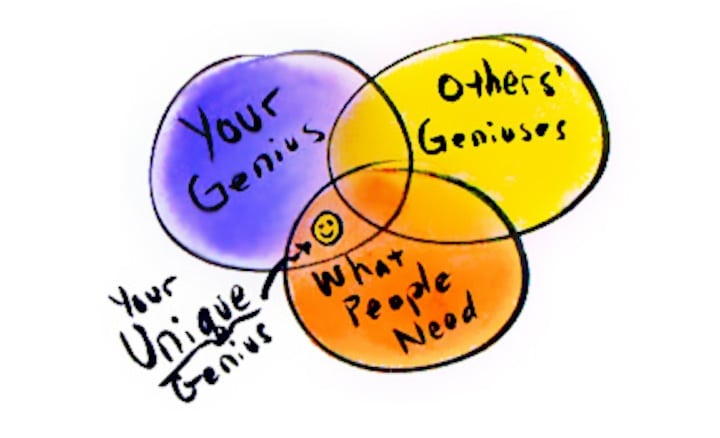Unique Genius Sales: Are You Scared Or Sick Of Selling?
Are you sick of “selling”?
 Is selling a necessary evil to you? Do you think people should just want what you have, just “get it”, and it’s frustrating to you when they don’t? Do you think to be great at selling either new ideas or products) you need to be aggressive, fake, or self-centered? Perhaps you even hate (or think you’d hate) selling. Or never realized what an important skill it is to achieving anything in work or life…
Is selling a necessary evil to you? Do you think people should just want what you have, just “get it”, and it’s frustrating to you when they don’t? Do you think to be great at selling either new ideas or products) you need to be aggressive, fake, or self-centered? Perhaps you even hate (or think you’d hate) selling. Or never realized what an important skill it is to achieving anything in work or life…
Learn:
- Why you need the skill of selling to accomplish anything in work or life.
- How to help people buy into your vision.
- To bring in more money, more easily.
- How you (and your clients) can love selling, it can be enjoyable and meaningful.
- Why honesty is your foundation in selling.
- Empower everyone on your team to be more effective at representing your organization, both with outside prospects and internal people.
Must You Be Psychopathic To Sell?!
“Selling” is not just for salespeople; it is a vital skill needed by anyone who wants to make things happen in work or life.
Closing a software deal, getting a job or promotion, raising money, starting a company, recruiting people, getting buy-in from people on a new project, inspiring people to volunteer, finding distribution for a film, getting press, get your friends to go on a roadtrip, raising money for a non-profit…these are just a few examples of when you need to be able to sell if you want to move something forward. Nothing happens until someone first buys into an idea you are selling.
Unfortunately, while selling is a necessary skill for success, it’s perhaps the least appreciated.
A recent book, The Wisdom of Psychopaths: What Saints, Spies, and Serial Killers Can Teach Us About Success, by Oxford University psychologist Kevin Dutton, lists the “Top 10 Professions That Attract Psychopaths.” Would you be surprised to learn that “salespeople” is on the list?!
If you’re like me – as now I see how valuable and meaningful people who can sell are – first you thought “that’s funny!” And then pause – realizing that most of the world still doesn’t like or appreciate salespeople or “selling”. Most people associate it with being chased down, bothered or manipulated.
(Just last night, my alma mater Stanford called me at 9p last night asking for a donation. I didn’t pick up, but they only ever call to ask for money. Next time they call, I’m going to ask them to remove me from their list. I’m sure their data showed that more people pick up the phone at night – and they made the short-sighted, and I would say selfish, decision to call people during dinnertime. How does that help their alumni, their ‘clients’?)
Selling Can Be Honorable
What descriptions do you think of when you hear “sales” or “salespeople”? Most people say “aggressive”, “fake” and the like. Even my wife Jessica said “greasy”. Why can’t we begin associating more words like helpful, sincere, expert, noble, honest with people who sell?
Who, as a child or teen, dreams about being in sales? The profession of “sales” ranks low on the totem, because people don’t see how vital it is as a daily skill, and because of the profession’s unsavory reputation for selfishness and greed. “Eww – you want to do sales!?”
Ironically, even though sales is the way most companies bring in the lifeblood of a business – money – it’s barely acknowledged at business schools! It’s just not prestigious like Operations or Strategic Marketing (whatever that is).
Well, that is going to change.
I NEVER imagined that I’d grow up to be a sales author and consultant/teacher. Even leaving Salesforce.com back in 2006, the “one thing” I knew I wouldn’t do was sales consulting!
Yet since then, I’ve become an advocate for the skill of selling, and a believer that selling can and should be both a) much more effective while b) being honorable and feeling good for the people involved.
Customers are sick of being sold to. They don’t want to deal with salespeople who are annoying, can’t teach them anything useful, and only want to selfishly move them some one-sided sales process so they can look good to their manager during weekly sales calls. I wish I could say this was the exception in sales…but it’s more the rule.
Customers won’t enjoy or value your style of selling until you combine better sales techniques AND honor.
The thing that I have never enjoyed about the world of sales is the amount of neediness in it. This is what drives CEOs to treat sales executives poorly, and they in turn to treat salespeople poorly…who then don’t give prospects the best service.
With all these frustrations around sales and the sales profession however, the world needs “selling”. It’s not a necessary evil, it’s an incredibly valuable skill.
An entrepreneur can’t get an idea off the ground without being able to sell themselves and their first clients. Non-profits can’t get started, bring in large donors or partner with important organizations or governments without “selling”.
In an existing business, a world-class sales team and approach can make the difference between 10% growth and 100% growth. It can make the difference between survival and bankruptcy.
Selling can be a noble skill and profession. It should be honorable. The skill of selling brings money into companies while helping customers adopt important new tools and practices. People who sell (including entrepreneurs) are on the frontlines every day; they are a company’s most important point of contact with customers!
So why do we expect such poor behavior from ourselves and them? Why are so many people who sell encouraged to be fake, rude, annoying, aggressive and even dishonest? To “get the deal done” whether or not “the deal” is actually good for a client or not?
Perhaps the concept of “honor” has become old fashioned, but I’m bringing it back.
Are you proud of how you sell?
You may be proud of your results, are you also as – or more – proud of how you sell? Do you ever leave out uncomfortable truths in tough situations, either with a client or manager? Do clients trust you to do the right thing? Do you trust yourself to do the right thing?
Every sales team has some unhelpful behavior going on that’s hurting your long-term results and their morale. This is because the way we learned to sell over the past decades is not what will work in the future. Perhaps what’s always worked for you isn’t working so well anymore.
I’m designing this course to be used primarily by two kinds of people: your salespeople first, and all your employees second.
(Can you imagine what your culture and company would be like if everyone could sell effectively, whether to prospects or internally? A lot of great ideas are stifled because employees have them…and have no idea what to do with them, not knowing how to sell them internally.)
Most people think of “selling” and salespeople as manipulative, greedy and slick.
The salespeople are generally needy, and they almost can’t help but tend to want to manipulate buyers with selective truths. This is why so many people are sick of being sold to – customers get frustrated because its hard to get the truth from salespeople and companies. When was the last time a salesperson told a prospect “I’m sorry, but I think our competitor X would actually be a better fit for what you need.”
Of course the way salespeople have treated prospects for centuries, it makes them more skeptical (and cynical)!
The most successful salespeople and companies today and the future are the ones that succeed by being skilled AND honest. Authenticity, from both the company and each individual, builds trust with prospects (increasing sales), and helps both buyers and sellers feel good about the process. There are no unhappy surprises or festering resentments after the sale is done.
Whom I’m Speaking To
The rest of this course is primarily for someone who sells professionally, such as an Account Executive in a software company. The principles though can be used by anyone who wants to learn to sell, whether an entrepreneur, non-profit founder, middle-manager or teen.
Four Places Salespeople Go Wrong
- When people are selling primarily to for money, status or approval (pleasing their parents – either mommy or daddy issues). Selling to someone who is not ready or doesn’t really need it – just because someone wants to give you money, doesn’t mean they’re a good customer
- Too many rules for themselves – salespeople tend to be over achievers, very focused on money and goals and very competitive – these factors make it harder to focus on doing the ‘right’ thing for the client – tend to want to succeed and win, even if it’s not the best thing for other people – [they tend to do what’s not the best thing for themselves either]
- Stuck on the career ladder: They get in a sales career ladder and they stick to selling…regardless of how much they hate or enjoy it… they don’t branch out and try new things.
- Get sucked in: Lose sight of their values, while competing, chasing money and winning [this describes the CEO too= winning becomes more important than family, their health, or doing the right things for others]
Unique Genius Selling: Where To Begin
1) Honesty
Everything depends on impeccable honesty – with yourself and others. Without honesty, nothing else here matters. You only can control yourself and your honesty. You can’t make anyone else – clients, coworkers, managers – be honest. You set the example. This means:
- Don’t lie or fib (this is especially common while prospecting or negotiating).
- Don’t bend “honesty” rules – you know what is right and wrong.
- Don’t tell partial truths out of fear.
Sometimes intensely competitive people, or people in an intense competition, are sorely tempted to bend the truth or rules.
People are very susceptible to their environments and social pressures, and if you’re within a whisker of going to being #1, going President’s Club, or winning some internal sales competition, or need that one deal to pay the mortgage, it is VERY tempting to do ‘whatever it takes’ to cross the finish line – including things you regret later.
No competition, deal or job is worth winning if it damages your integrity. It will affect both your reputation and how you sleep:
1) The “external” reason – if you hide something or lie, it WILL catch up with you and your reputation. We live in a world of frictionless karma now, and ALL parts of your reputation easily follows you. In the past you could hide things, even fake contracts submitted as a real deal! Not today.
2) The “internal” reason – a clear conscious is the softest pillow. By being honest and transparent, you clear out the mental clutter of hiding secrets. Secrets and worries fester in your mind (both consciously and unconsciously)…which affects your waking hours, attitude, productivity and effectiveness.
Why It’s Hard To Tell The Whole Truth
In telling the raw truth, it can trigger all kinds of fears – “What if they reject me? What if I lose the deal, and the money? What will my manager say?” etc. It can be challenging to remember that it will improve your changes with the “right” prospects, which include the prospects that appreciate honesty.
If you lose a deal because you’re honest, you’ll end up winning a lot more deals in the future; maybe you lose some deals now with telling the truth, but you’ll gain so much later.
For prospects that don’t value your honesty, or find that because of your honesty that there’s just not a mutual fit, it’s better to find and get out early. It’s like a marriage – it’s much easier to find out you’re not a fit while dating, rather than going through a painful and messy divorce years later.
Example Of A “Little Lie”
Sales & marketing is full of ‘little lies’ – subtle tricks and untruths that are common to accept as ok.
For example, one way to increase your email open rates is to put “Re: ” at the beginning of your subject line, when emailing people for the first time. It makes them think you already have a conversation going on, that perhaps they’ve forgotten about. This is not ok, however you want to rationalize it. Do you really want to begin a conversation with a lie?
2. SELFLESS LISTENING
Every sales trainer talks about “listening”. Every sales person knows they should. But it still doesn’t happen. When salespeople listen, they’re listening just enough to pick up any the cues, clues or signals they can use for their next “why you should buy” argument. They are selfishly listening rather than selflessly listening.
Do you find yourself on the edge of your seat, waiting for your turn to jump in to pitch your product? Of course you are excited to tell them how great your stuff is! (I know it happens, since I see it and I often feel the same way.) Salespeople forget to listen to what prospects and clients really need…not just what they are asking for.
A good rule of thumb is during conversations, salespeople should listen 2/3 of the time and ask questions 1/3 of the time.
The only way to improve at this is to practice watching yourself and your mind. When you’re listening, catch yourself when your mind starts wandering to “how can I best sell them my stuff”. Bring yourself back to asking again “how can I best help them?”
If you have someone who can listen in on your calls, it’s easier for them to give you feedback. Ideally it would be a third party, like a coach, who can be more impartial.
3. DON’T SELL TO PEOPLE WHO AREN’T READY
“Old sales” models train people to try to figure out – no matter where a prospect is, or whether they need the product or not – how to try to convince them to buy.
Part of listening is determining where the client is and accepting “where they are”. If they aren’t a good fit for what you do, if they’re not ready to take the next step, accept it. Don’t push them to do something that’s not good for them or what they’re not ready for yet. Trust what the prospect is saying is true (because it is, to them).
Then, the best sales person is an expert in what they do and knowing how to advise clients. After listening to and accepting where a client is, how can you authentically encourage them to make progress? What kind of advice or guidance would be most helpful to them?
At first glance it may seem to be a conflict to accept where they are and then pushing them or challenging them to take a step forward. The difference is, instead of selfishly trying to move them forward in your sales process, you are trying to move them forward in their business to help them (which often times will lead them to decide to work with you).
A sales person doesn’t only listen and accept, they also challenge and encourage clients to think differently in ways that are good for the client, and ESPECiALLY when it’s good for both the client and the salesperson.
Example: My Mother
A year or two ago, my mom bought a service from Hubspot, an online marketing automation company (and a good, reputable one). She attended a webinar and learned about inbound marketing. They did a great job selling her on that idea (as they should). I remember my mother calling me telling me how excited she was to sign up for this, to get leads coming to her for her tulips and flower bulbs business. I also remember thinking “there’s no way my mother yet knows enough to be able to follow through on this.” I may have even tried to help her see that…but she can be stubborn. (Whenever says I’m stubborn, and I ask her “where do you think I got it from?” :))
My mom talked to different people at Hubspot before signing up. If the Hubspot sales or support people had selflessly listened to my mother, I believe they should have been able to tell that she wasn’t at all ready to execute on inbound marketing. But I assume (dangerous, I know) that they were either too busy or excited at another sale and only heard what they wanted to hear. They didn’t challenge her to go educate herself first before buying.
If I were them, I would have said “ok – before you buy, go ready this guide on ‘Are You Ready To Do Inbound Marketing? and put together an editorial calendar for your content, and a couple of other steps so that we know you can actually take advantage of our service. We don’t want you to sign up too early and then fail out because you weren’t ready.”
Where people go wrong is lots of companies, only hear what they want to hear… this goes back to Listening section – they only hear what they want to hear because of that neediness for the sale.
(The same thing happened to my assistant Kristine, with Infusionsoft. They were so eager to sell her the service, and she bought into their vision, neither spent the time to determine if she was actually ready to succeed.)
If they aren’t ready, give them homework and resources/education. Help them see what they need to do in order to be ready to solve their problem or buy from you.
4. HELP PEOPLE MAKE GOOD DECISIONS
You’ll find that one of the best ways a salesperson can help a client is to help them make a decision. People make or avoid decisions for all kind of reasons – avoidance, to look good to a boss, lack of confidence or clarity, fear of mistakes, fear of change, etc.
It’s unfair to assume all your clients are good at decision-making. Many individuals struggle with this, whether it’s how to make any decision at all, or making a decision that’s the best for them rather than a “politically acceptable” one.
Do your best to avoid pressuring people into making a decision or go a certain direction. Your best friend is “education” – educating people on the value of the ideas you sell, how you can help, and even how to make the best decision. The old sales model would call this “objection handling”, which means you’re trying to knock down any objections in order to get them to move forward.
In Unique Genius Selling, the intention is to help educate them so that they can make the best decision for themselves, at the right time. And, if you believe in your service, you’re working with ideal prospects, building trust, etc – often times this will lead them to deciding to work with you without any pressure.
There is a certain kind of judgment you must develop here. Sometimes people can’t make a decision that’s in their best interests because they are unsure, anxious or want “perfect information” (which is impossible). You walk a fine line between encouraging them to get over their anxieties, but not pressuring them to make a decision before they’re ready or that’s not in their best interest.
===
“I used to hate the idea of selling. I thought salespeople had to be aggressive and fake. Then, in working with Aaron, I learned how to love sales (doing it and teaching it), and how important it is to all parts of my life, including outside of work. Now I really really enjoy it.” Alicia Anderson, Predictable Revenue
===
UPDATE
Download a phone presentation on “Authentic Selling”: a) download mp3 and b) call notes
====
Here ends the sample. For more, stay tuned! If you have suggestions or requests, please contact us.
Recent Guide
-
Field Guide: How to write an email
October 20, 2023 -
Elevate Your Sales Game: The Ultimate Guide to Cold Calling
September 18, 2023 -
Field Guide: Surviving Your First 90 Days as an SDR
March 30, 2023 -
The Ultimate Guide to Sales Coaching
May 6, 2022 -
The Ultimate Guide to Sales Development
March 10, 2022




